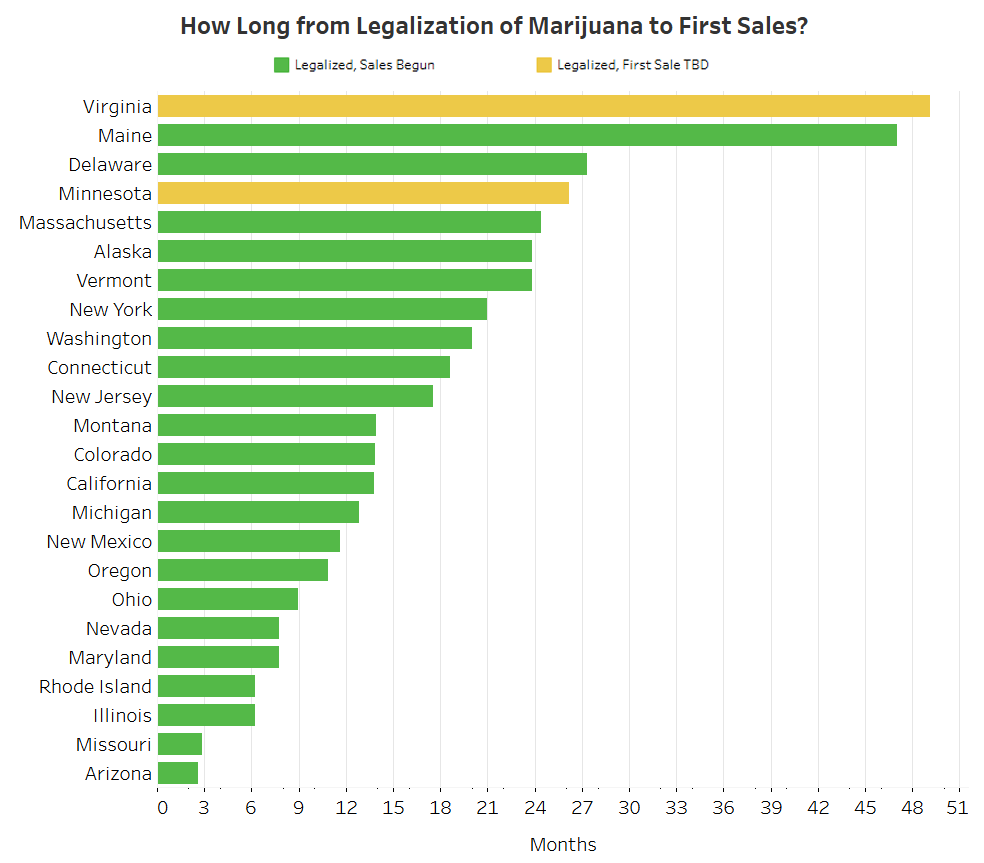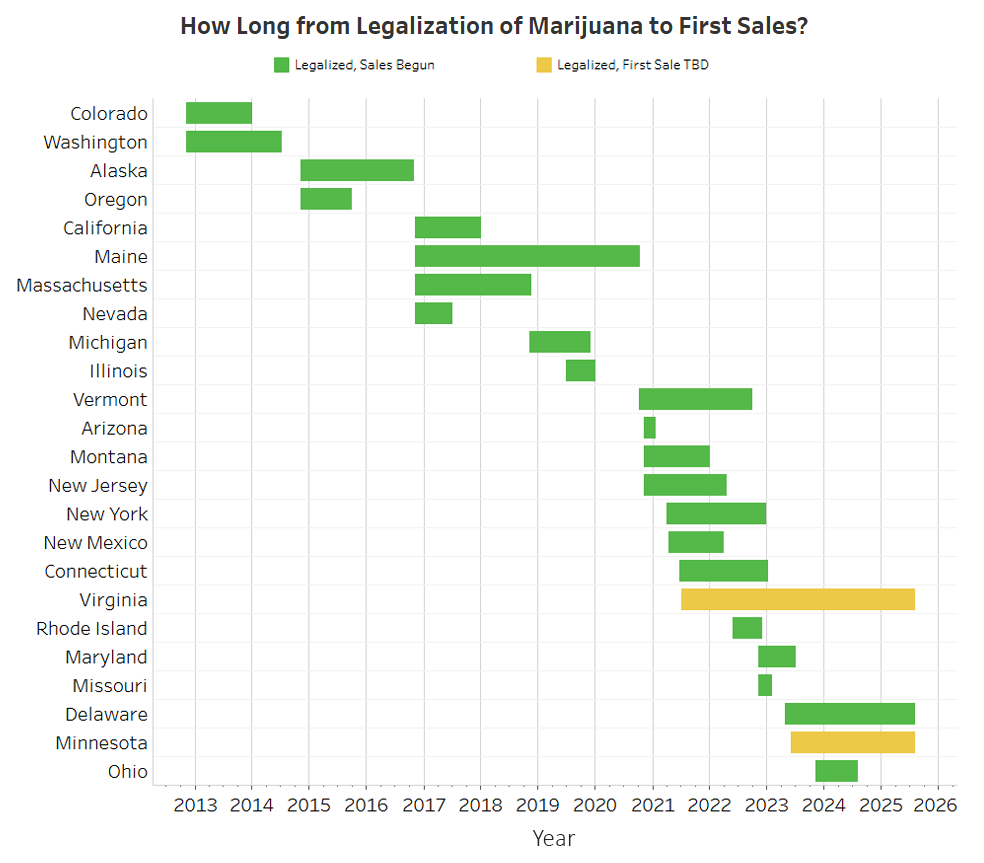On August 1, 2025, Delaware became the latest state to open their adult-use cannabis market to sales. The Rockefeller Institute has created a data visualization to track the implementation timeline for states from when they legalize adult-use cannabis—either by ballot measure or by legislation—to when the first legal dispensary in their state opens.

The new data tracker shows how long it takes states to move from adult-use cannabis legalization to legal sales.
The visualization shows that the implementation timeline can vary considerably even for states with more similar underlying policies, as there are many mitigating factors that determine how quickly (or slowly) a state is able to get their legal adult-use cannabis market up and running. Here are three high-level takeaways:
1. Political buy-in matters
The two states that have had the longest transition period from legalization of adult-use cannabis to the operations of legal state cannabis markets are Maine (47 months) and Virginia (49 months and counting). One common denominator in both instances has been opposition by the governor to legalization. In both states, governors have used their veto power to prolong the implementation process. In 2016, Maine voters passed a ballot initiative (Question 1) that legalized the consumption of cannabis for those over 21 and the creation of an administrative structure for the state to regulate the cultivation, sale, and taxation of cannabis. However, adult-use cannabis legalization did not have the support of then-governor Paul LePage. During a debate during his re-election campaign in 2014, LePage indicated that while he was opposed to legalization, if voters approved legalization he would support the decision. Prior to the 2016 election, Governor LePage released a video urging Mainers to reject Question 1, citing potential dangers associated with legalization, such as traffic deaths, increased potency, and consumption by children. After the ballot measure passed and was certified, however, LePage signed a moratorium bill that put a year-long hold on the cultivation or sale of adult-use cannabis. In November 2017, LePage then vetoed a bill passed by the Maine legislature that would have regulated the sale of cannabis, citing concerns over how the federal government would handle state cannabis programs under then-Attorney General Jeff Sessions. The legislature passed a new bill in May 2018, which was again vetoed by LePage; this time, however, the legislature had enough votes to override the veto and enact the bill. Maine had some additional delays, however, in launching sales due to public health concerns associated with the Covid-19 pandemic, with dispensaries finally opening in November 2020 rather than their target date of Spring 2020.
In Virginia, part of the delay in the opening of cannabis dispensaries was by design. Adult-use cannabis legislation was passed by the Virginia legislature and signed by then-governor Ralph Northam in 2021, but it only immediately legalized possession and cultivation for personal use, setting the target date of 2024 for the opening of adult-use cannabis dispensaries. This delayed start was a concession in the legislative process to build support for the bill’s passage and to allow the state time to think through implementation. However, the sections of the bill creating the commercial market for adult-use marijuana included a “re-enactment clause,” which necessitates a second passage before going into effect. Glenn Youngkin, an opponent to adult-use cannabis, was elected governor in 2021and was “not interested” in working with the legislature to create a regulatory system for cannabis licensing. Governor Youngkin vetoed cannabis legislation in both 2024 and 2025 that would have paved the way for Virginia to commence legal adult-use cannabis sales. The future of cannabis in Virginia will therefore likely hinge on the outcome of the 2025 gubernatorial election; Virginia does not permit incumbent governors to run for re-election, so Youngkin’s term will end this year. Congresswoman Abigail Spanberger, the Democratic candidate, has stated her support for a regulated adult-use cannabis market, while Lieutenant Governor Winsome Earle-Sears, the Republican candidate, is more aligned with the policies of the Youngkin administration and is opposed to adult-use cannabis.
While Massachusetts did not have quite as long of a transition period as Maine and Virginia, many of the key political actors in the state were not on board when voters enacted adult-use cannabis via ballot measure in November 2016, and the lack of buy-in likewise worked to delay implementation. Governor Charlie Baker and Boston Mayor Martin Walsh campaigned against legalization, and the state Senate issued a report in March 2016 that warned against the dangers of legalization and outlined the actions that the legislature could take to temper potential impacts if voters were to support legalization. In December 2016, Governor Baker signed a bill that would delay the deadlines in the ballot measure by six months, pushing the target date to commence marijuana sales from January 2018 to July 2018. The first sales in Massachusetts ultimately began in November 2018.
2. Using existing medical cannabis infrastructure may help speed up implementation
The states that were able to move the most quickly from legalization to adult-use cannabis sales all share one common trait—initial sales were handled by existing medical cannabis dispensaries. Arizona (3 months), Missouri (3 months), Illinois (6 months), Rhode Island (6 months), Maryland (8 months), Nevada (8 months), Ohio (9 months), Oregon (11 months), and New Mexico (12 months) leveraged their network of already established dispensaries for the first wave of sales, as their respective state governments worked through the process of licensing new dispensary locations to expand the market. The medical dispensaries did have to go through some additional approvals to widen their portfolios to include adult-use cannabis sales, but that process was less cumbersome and faster than licensing brand new dispensaries. Using businesses that were already legally selling medical cannabis helped many states hit the ground running, though it also provides a bit of a short-term monopoly to the medical cannabis dispensaries that benefited from the initial boom in adult-use cannabis sales. This was less of an option for states that did not already have a robust medical cannabis program—Minnesota and New York, for example, had relatively restrictive medical cannabis programs with limited medical cannabis operators. And using the existing medical cannabis infrastructure did not necessarily guarantee a quick turnaround time. New Jersey, for example, also initiated adult-use sales with their existing medical cannabis dispensaries, but their implementation was still 18 months after legalization due, in part, to delays in the roll out of regulations and approvals by the Cannabis Regulatory Commission.

The tracker also presents the legalization-to-sales data as a timeline, showing how legalization and market development have unfolded since 2012.
3. Lawsuits slow everything down
Adult-use cannabis is big business, and the competition for licenses has only expanded as more states have legalized and the industry has expanded. This has also resulted in more lawsuits being filed challenging states’ regulatory systems and, in particular, their processes for licensing. While these issues work their way through the legal system, lawsuits often cause significant delays for the full implementation of adult-use cannabis programs. For example, New York’s adult-use cannabis law placed an emphasis on social equity, allowing those with prior cannabis convictions to be the first to receive licenses and designating funds to assist cannabis entrepreneurs with opening dispensaries. The Marihuana Regulation & Taxation Act, passed by the legislature in 2021, was the most ambitious social equity program in any state—and was promptly met with lawsuits and injunctions that prohibited the Office of Cannabis Management from issuing adult-use cannabis licenses (later narrowed to only prohibiting licenses in five of fourteen regions). Minnesota’s adult-use cannabis sales rollout has also been delayed by lawsuits—their November 2024 social equity lottery for licenses was put on hold by a judge to allow legal challenges to the process for selecting those eligible for the lottery to play out. The lawsuits were resolved, and the lottery for licenses was eventually held in June 2025.
The path from adult-use cannabis legalization to implementation varies widely from state to state, and existing cases reflect that the timeline for this roll out is shaped by political dynamics, reliance on existing infrastructure, and legal challenges. Some states have successfully accelerated implementation by leveraging their medical cannabis framework, while others have faced delays due to political opposition or litigation. The Institute’s data visualization highlights how complex the process can be. As more states move toward legalization, the successes and setbacks from those states that have legalized before them can be illustrative in how to create an efficient adult-use cannabis market.
ABOUT THE AUTHOR(S)
Heather Trela is director of operations and fellow at the Rockefeller Institute of Government

